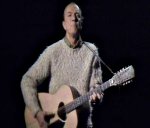The PBS series American Masters devotes tonight's installment to a performer with a very song, storied and musical history: Pete Seeger, the blacklisted banjo player whose career achievements include popularizing folk music, protesting the Vietnam War and spearheading a movement to clean up the Hudson River.
Pete Seeger: The Power of Song (9 p.m. ET; check local listings), by necessity, is as much a political as a musical journey. Musically, we learn how and why he was so exposed to, and interested in, what's now called roots music as a very young child, and how he came to pick up and champion an unlikely instrument, the banjo.

But that was after playing hit songs of the 1920s on the ukelele to school classmates. The documentary offers firsthand testimony from Seeger's brother, and later his wife, who corroborate the most unlikely of stories - how a man stayed true to his beliefs, and his belief in his country, even when it was all but impossible to reconcile the two.
The playbook of songs with which Seeger is associated, with and without the folk group The Weavers, includes "Goodnight Irene," "Little Boxes," "Turn Turn Turn," "Wimoweh," "Guantanamera," "If I Had a Hammer" and the hugely influential "We Shall Overcome" (which he adapted before it became adopted by Martin Luther King, Jr. and the civil rights movement) and "Waist Deep in the Big Muddy."
Seeger wrote that one, and performed it in the 1960s on The Smothers Brothers Comedy Hour - but not without difficulty. Seeger's appearance on that show ended his 17-year blacklist from network prime time, but "Big Muddy," an anti-war song obviously aimed at LBJ's Vietnam policy, was cut by CBS. It was reinserted the following year, and still is a very powerful performance and TV moment.
Other potent moments in the documentary include his large-group singalongs, seen in different decades at a wide variety of events and locations; people like Johnny Cash and Arlo Guthrie, sticking up for Seeger's unflagging activism and marveling at his unflagging optimism; and having him declare ambitious goals - the end of a war, the rebirth of a river - only to see them eventually come true.
When I began working on a book about The Smothers Brothers Comedy Hour, Pete Seeger was the first person, other than Tom and Dick Smothers, I interviewed. That was 14 years ago... and my optimistic dream is that, this year, it'll finally be completed, I time for the brothers' 50th anniversary as a performing group next year.
To everything, turn, turn, turn, there is a season...
Meanwhile, watch tonight's American Masters. Tom Smothers is in there - and so are decades of music and activism from an admirably pure performer.